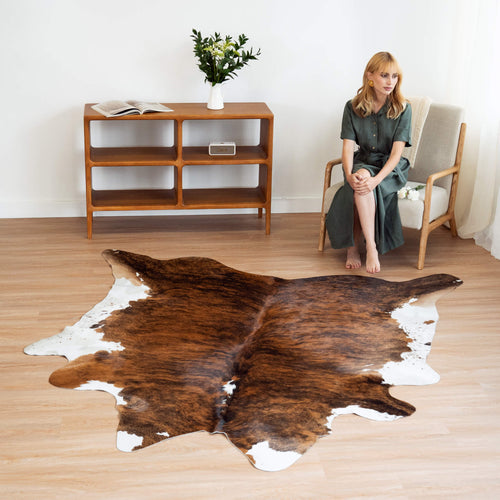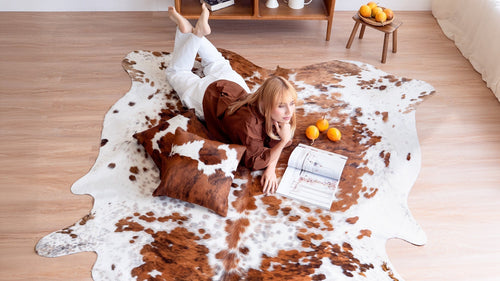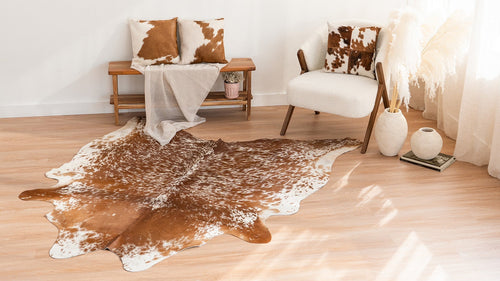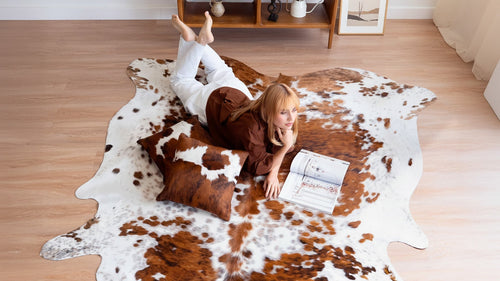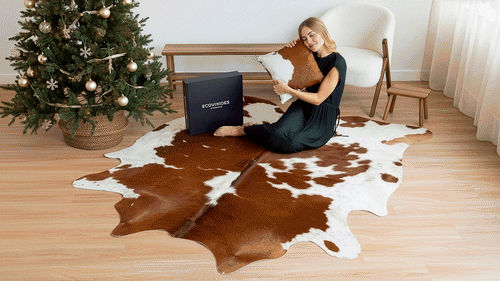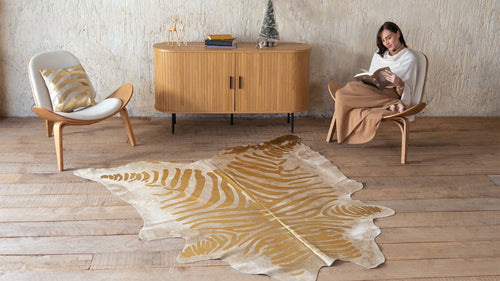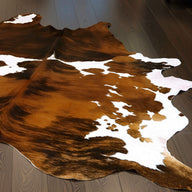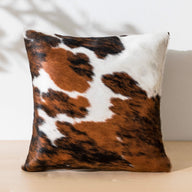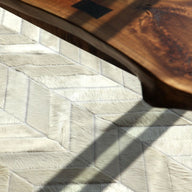There's something undeniably captivating about a Beautiful Cowhide Rug sprawled across your living room floor. The unique patterns, the luxurious texture, the natural warmth it brings to a space – it's no wonder these pieces have become staples in modern home design. But if you're like me, you've probably wondered at some point: "Is Cowhide Ethical?" Well, I'm here to put your mind at ease. As someone who's spent years in the Natural Cowhide industry, I can tell you that there's much more to the story than meets the eye, and it's overwhelmingly positive.
Today, I want to walk y'all through the real story behind Cowhide Products – where they come from, how they're made, and why they might just be one of the most ethical and sustainable decor choices you can make for your home. Let's separate fact from fiction and discover why Cowhide isn't just beautiful – it's a responsible choice you can feel good about.

The True Origin of Quality Cowhide Products
When folks ask me, "Are cows killed specifically for their hides?" I always appreciate the concern that drives this question. It shows a genuine care for animal welfare that we should all share. The straightforward answer is no – and this is the cornerstone of why Cowhide Products are considered ethical.
Cowhide is what we call a "by-product" of the meat industry. This means that no cow is ever raised or harvested solely for its hide. In the United States and most countries worldwide, the hides used for Cowhide Rugs and other products come exclusively from animals already designated for food production. These animals would be processed for beef regardless of whether their hides were utilized or discarded.
In fact, using these hides actually represents a form of respect for the animal by ensuring that nothing goes to waste. Think about it this way; when an animal is already part of the food supply, using more of what it provides—like the hide—is a meaningful way to honor its life. That's exactly what happens with Hair-On-Hide.
The cattle industry in the US processes approximately 33 million cattle annually for food production. Without the Cowhide industry, these millions of hides would simply become waste material, ending up in landfills. Instead, they're transformed into beautiful, durable products that can last for generations in your home.
This is sustainability in action – taking what would otherwise be discarded and creating something of lasting value and beauty. When you bring a Natural Cowhide Rug into your home, you're not contributing to additional animal processing; you're participating in a more complete and respectful use of resources that already exist.

Sustainability and Environmental Benefits of Cowhide
When we talk about sustainable decor options, Cowhide deserves a prominent place in the conversation. As a natural material, it offers several environmental advantages that synthetic alternatives simply can't match.
First, let's consider longevity. A Quality Cowhide Rug isn't a temporary home accessory – it's an investment that can last for decades with proper care. Unlike mass-produced synthetic rugs that might need replacement every few years, a well-made Cowhide Products stands the test of time. This durability means fewer resources consumed over the long run and less contribution to our growing landfill problem.
Speaking of landfills, leather is biodegradable. When a synthetic rug reaches the end of its life, it could sit in a landfill for hundreds of years. A Natural Cowhide Product, however, will eventually return to the earth. There's something beautifully cyclical about that, don't you think?
The Ethical Sourcing Journey: From Farm to Living Room
Understanding where your Cowhide Rug comes from is an important part of making an informed ethical choice. The journey of a Quality Cowhide from farm to your living room follows a path that prioritizes respect and responsibility at every step.
It all begins on cattle ranches, many of which follow sustainable grazing practices that actually benefit the environment. Properly managed grazing can improve soil health, increase biodiversity, and even help with carbon sequestration. Ranchers who care for these animals have a vested interest in maintaining healthy, humane conditions – after all, stress-free animals produce better quality everything, from meat to hides.
After processing for the meat industry, the hides are carefully selected for quality. Only the best make it to the next stage. This selection process ensures that nothing is wasted – even hides with imperfections find appropriate uses in various industries.
The tanning process is where art meets science. Traditional tanning methods have been refined over generations to preserve the hide's natural beauty while ensuring durability. Modern ethical tanneries focus on:
- Water conservation and recycling systems
- Proper waste management and filtration
-
Safe working conditions for skilled craftspeople

Many reputable Cowhide suppliers now work exclusively with tanneries that adhere to international environmental standards. Some even carry certifications that verify their commitment to ethical practices throughout the supply chain.
The final stages involve careful inspection, quality control, and preparation for sale. When you purchase from a responsible supplier like eCowhides, they should be able to tell you about the origin of their Cowhide Products and the standards they maintain.
I always tell customers that asking questions is not just okay – it's encouraged! Ethical suppliers have nothing to hide (pun intended) and will be happy to share information about their sourcing practices. Some questions worth asking include:
- Where do your hides originate from?
- Do you work with suppliers who follow humane animal handling practices?
- What type of tanning process do you use?
- Do you have any environmental certifications?
Remember, transparency is the hallmark of ethical business. When companies are open about their practices, it reflects their commitment to responsible sourcing and production.
Cowhide vs. Synthetic Alternatives: An Ethical Comparison

When considering home decor options, many environmentally conscious consumers find themselves weighing the ethics of Natural Cowhide against synthetic "vegan" alternatives. This comparison isn't as straightforward as it might initially appear, and the results might surprise you.
Synthetic rugs and faux hides are typically made from petroleum-based products like polyester, acrylic, or PVC. While these materials don't involve animal products, their environmental footprint is substantial. The production of these synthetic materials:
- Relies on non-renewable fossil fuels
- Releases microplastics that pollute water systems
- Involves energy-intensive manufacturing processes
- Creates products that won't biodegrade for centuries
- Often utilizes chemical dyes and treatments with environmental impacts
In contrast, Cowhide utilizes an existing by-product that would otherwise become waste. The environmental impact of a Cowhide Rug must be considered in context – the cattle have already been raised for food production, so using the hide doesn't create additional demand for animal farming.
Let's think about this from a whole-system perspective. If we're already raising cattle for food (and realistically, this isn't changing anytime soon), then using every part of the animal is the more ethical choice compared to discarding useful materials and then manufacturing synthetic alternatives from scratch.
Additionally, Natural Cowhide Products offer practical benefits that make them a more sustainable long-term choice:
- Superior durability (lasting decades rather than years)
- Natural stain resistance requiring fewer cleaning chemicals
- Hypoallergenic properties beneficial for many households
- Ability to age beautifully rather than deteriorating
While synthetic alternatives continue to improve, they simply haven't matched the performance, longevity, or natural beauty of Genuine Cowhide. When a product lasts three to five times longer than its alternative, that means fewer resources consumed over time and less waste created.
Making Ethical Cowhide Choices: What to Look For

If you've decided that a Cowhide Product aligns with your ethical values (and I hope I've helped clarify why it absolutely can), the next step is ensuring you purchase from suppliers who maintain high ethical standards. Here's what to look for when shopping for Ethically Made Cowhide Rugs Products:
Transparency in Sourcing
Reputable suppliers should be able to tell you where their hides come from. Many Quality Cowhide Products originate from countries with strong animal welfare regulations, such as the United States, Brazil, and Colombia. When companies are open about their sourcing, it typically indicates confidence in their ethical standards.
Certifications and Standards
Look for suppliers who work with tanneries that meet international standards. Certifications like:
- Leather Working Group (LWG) certification
- ISO 14001 (Environmental Management)
- REACH compliance (EU chemical regulations)
These indicate adherence to recognized environmental and ethical standards in processing.
Quality and Craftsmanship
High-Quality Cowhide Products reflect respect for the material. Well-crafted items last longer, which means fewer resources used over time. Look for:
- Natural variations in color and pattern (indicating minimal chemical processing)
- Strong, secure backing on rugs
- Even, careful tanning throughout the hide
- Proper finishing on edges and seams for products like pillows or furniture
Company Values
Research the company's overall approach to sustainability and ethics. At eCowhides, responsible practices aren’t just a footnote—they’re the foundation. Our commitment to environmental stewardship and ethical values extends from the ranch to your rug. When you choose eCowhides, you’re supporting a company that actively upholds sustainability and transparency every step of the way.
When you purchase Responsibly Sourced Cowhide, you're not just bringing home a beautiful piece – you're supporting practices that honor both the environment and the animals these products come from. You're also making a choice for quality that will serve you well for many years to come.
FAQ: Cowhide Ethics Edition

Is owning a Cowhide Rug considered unethical?
No, owning a Cowhide Rug is not unethical when you understand its origin. Since Cowhide is a by-product of the meat industry that would otherwise go to waste, using these hides actually represents a more complete and respectful use of the animal. No additional animals are harmed specifically for rug production.
Are cows killed specifically for their hides?
Absolutely not. Cows are not raised or harvested solely for their hides. The hides used for Cowhide Products come exclusively from animals already processed for food production. The Cowhide industry simply utilizes material that would otherwise be discarded.
Is Cowhide a by-product of the meat industry?
Yes, Cowhide is 100% a by-product of the meat industry. The cattle are raised primarily for beef production, and the hides are a secondary product. Using these hides for rugs and other items reduces waste and maximizes the utility derived from each animal.
What makes Cowhide Rugs an ethical choice?
Cowhide Rug represent an ethical choice because they utilize existing by-products, reduce waste, are long-lasting (reducing consumption over time), and are biodegradable at the end of their life cycle. When properly sourced, they support sustainable farming practices and responsible manufacturing.
Are there cruelty-free Cowhide options available?
While Cowhide necessarily comes from animals, ethically sourced Hides come from operations that follow humane animal handling practices throughout the animal's life. Look for suppliers who can verify their hides come from farms and processors with established animal welfare standards.
Is Cowhide considered sustainable?
Yes, Cowhide is considered sustainable because it utilizes what would otherwise be waste material, lasts for decades (reducing consumption), and is biodegradable. This contrasts with synthetic alternatives made from new petroleum-based materials that don't biodegrade.
Are vegan alternatives to Cowhide better for the environment?
Not necessarily. While vegan alternatives don't use animal products, they typically rely on petroleum-based synthetic materials that have significant environmental impacts, including microplastic pollution and non-biodegradability. Natural Cowhide often has a lower overall environmental footprint when considering the full lifecycle of both products.
Can I buy ethically sourced Cowhide Rugs?
Absolutely! Many suppliers specialize in ethically sourced Cowhide Products. Look for companies that provide information about their sourcing practices, work with reputable tanneries, and emphasize quality and sustainability in their business model.
What certifications or labels indicate ethical Cowhide sourcing?
Look for suppliers working with tanneries certified by organizations like the Leather Working Group (LWG), which rates tanneries based on environmental performance. ISO 14001 certification and REACH compliance compliance are also good indicators of responsible processing practices.
Conclusion: Embracing Natural Beauty with a Clear Conscience

When it comes down to it, choosing a Natural Cowhide Rug or product isn't just about bringing timeless beauty into your home – it's about making a responsible choice that aligns with values of sustainability, waste reduction, and respect for natural resources.
The journey of a Hide from farm to your living room represents a full-circle approach to consumption. Rather than creating demand for new materials or letting valuable resources go to waste, Cowhide Products honor the animals they come from by ensuring their hides serve a purpose beyond the meat industry.
In our world of fast fashion and disposable decor, choosing quality pieces that last for decades is perhaps one of the most environmentally conscious decisions we can make. A Beautiful Cowhide Rug isn't just a statement piece – it's a statement of values that prioritize longevity over trendiness and authentic materials over artificial alternatives.
If you've been hesitating to bring a Hair-On-Hide Piece into your home due to ethical concerns, I hope this exploration has helped put your mind at ease. When sourced responsibly and produced with care, Cowhide Products represent a harmonious balance between stunning aesthetic appeal and ethical consumption.
Ready to transform your space with the timeless beauty of Ethical Sourced Cowhide? Browse our collection of Premium Quality Cowhide Rug, each one unique in pattern and character, yet unified in their ethical origins. Your perfect natural treasure – and the peace of mind that comes with it – is just a click away.






